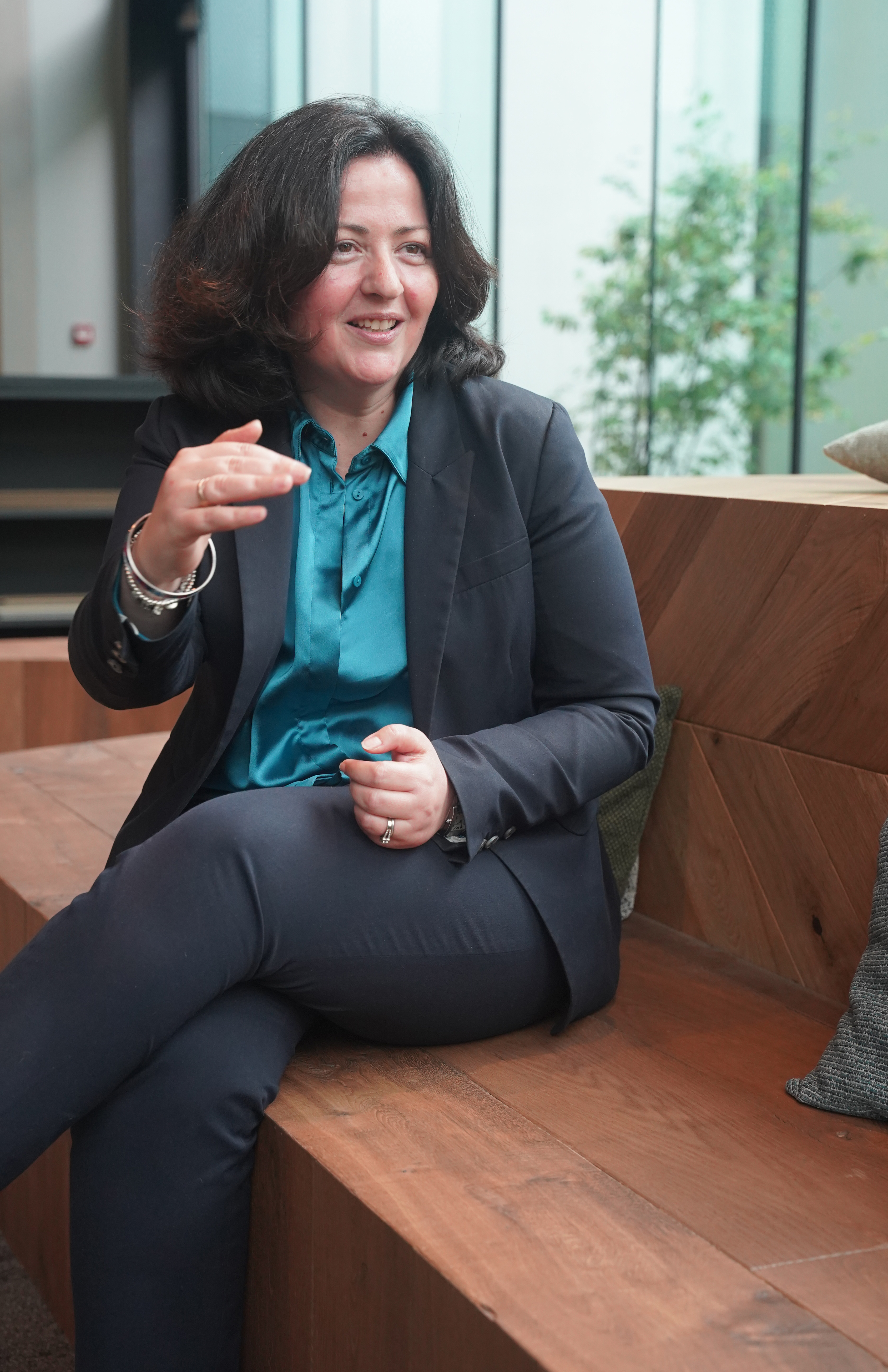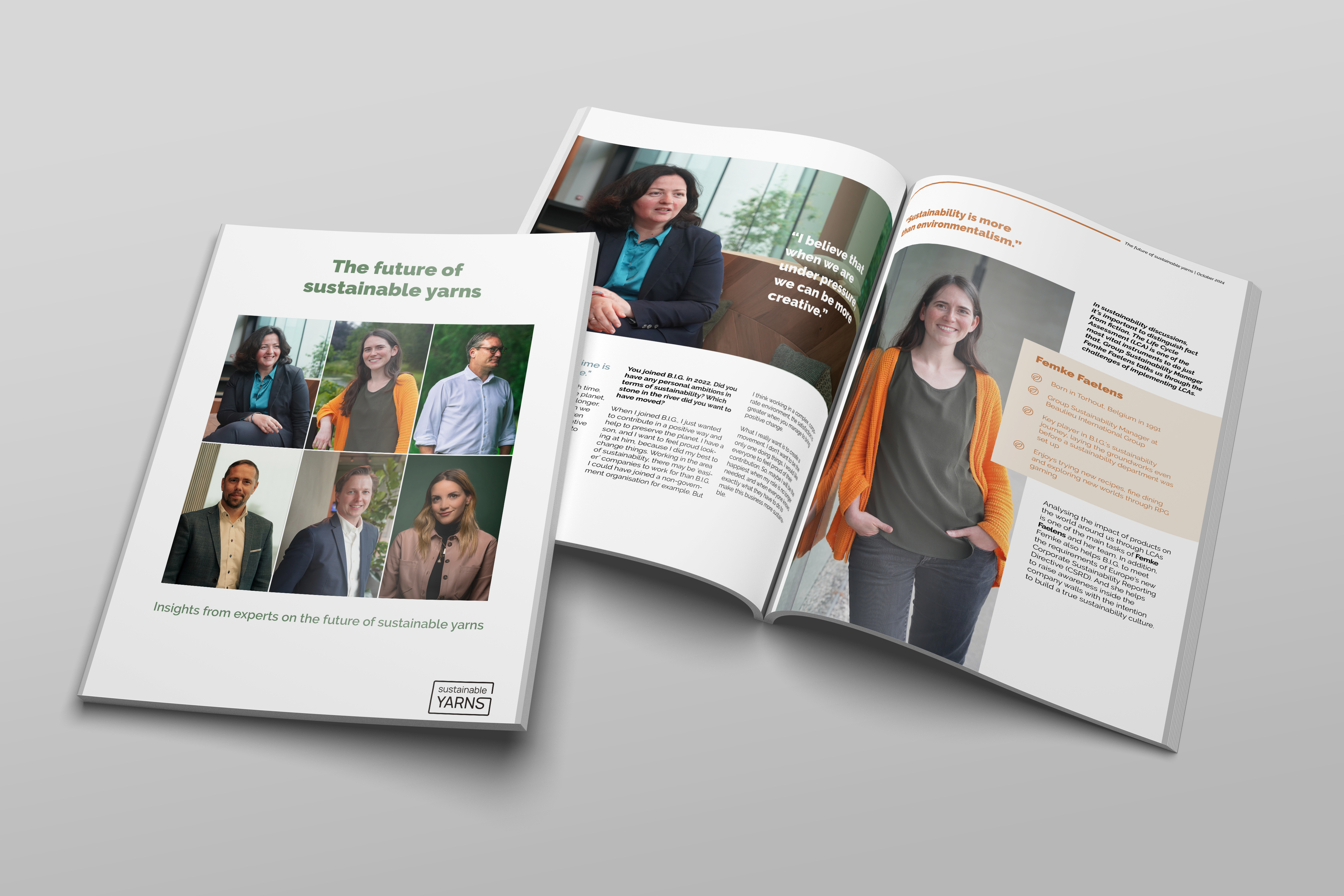Let’s be in that first 10%. Let’s set the bar high.

Sustainability is not something you can achieve alone. For Clara Carelli, it’s a matter of creating a movement, where every employee joins the effort. But it’s also about setting up an ecosystem of partners and suppliers who understand that sustainability is the future.
Clara Carelli
- Born in Rome, Italy in 332 ppm*
- Group Sustainability Director at Beaulieu International Group
- Optimist and firm believer everyone can contribute to a better world
- Likes to travel and explore new cultures (next stop: Mount Fuji)
* Curious what this means? Have a look at www.nature.org to see how much carbon was in the atmosphere when you were born.
In her role of Group Sustainability Director at B.I.G., Clara Carelli has made it her mission to drive the company’s efforts to become a fully sustainable group. But Clara is humble enough to realise she cannot do it alone. “I like to think that I have a team that supports me in this mission. Not a team of four people, but of almost 5,000 enthusiastic B.I.G. co-workers.”
B.I.G. co-workers seem to take sustainability to heart. Is that also your impression?
Absolutely! It works both in a top-down and bottom-up fashion. From a corporate side, we have articulated our mission and our strategy to become a more sustainable company. And people seem to lean into it too. On the other hand, I also feel the drive from our employees. They believe sustainability is the future, they are proud to be part of an ambitious company, and they want to actively participate in our journey towards reducing our climate impact.
“There can be no sustainability without transparency.”
In 2023, B.I.G. was the highest climber in the FINN ranking on sustainability reporting for Belgian companies. The company seems to be taking sustainability communication more seriously than ever.
I think the ranking tells us that our commitment is credible and that the whole company is working diligently to reduce our impact. Transparency on both positive and negative impacts is very important in this. In our sustainability report I stressed that people would get the truth, and nothing but the truth. If we achieve something, we’ll be glad to report it, but if we fall short, we will be open about it too. There can be no sustainability without transparency. That’s why it’s important to work science-based, and then gain objective, third-party recognition for your actions.
“We need to transform ourselves from being part of the problem to being part of the solution.”
Looking at yarn manufacturing and the carpet industry as a whole, what are the biggest sustainability challenges today?
Embracing circularity is a huge challenge. As Group, B.I.G. commercialises more than one million tons of plastics every year. That is not a small number. We need to transform ourselves from being part of the problem to being part of the solution. We’re working on that, but it’s not easy.
For the carpet industry in particular, I think there are two main challenges. First, we need to work on less impactful raw materials. We need to look at how we can design products in a more environmentally-friendly way, but at the same time, we need to face cost and availability challenges. Second, we need to look at how we organise the end of life of products. Products can be designed to be more recyclable, but you also have to take logistics into account. Right now, our global economy is not organised efficiently to tackle this. That’s definitely not a challenge B.I.G. can solve alone.
B.I.G.’s Route 2030 nevertheless seems very ambitious, and includes much more than the environmental aspect.
Indeed, for example, there’s the social aspect that typically tends to get snowed under. It means that we will not just work with any supplier. We screen our value chain partners in terms of ethical business conduct. For example, we look at corruption, are they respecting human rights, do they provide a safe and healthy working environment, do they prevent pollution? That’s all part of the bigger sustainable picture. If suppliers don’t meet our high standards, we won’t work with them. So, at least you know, when you are buying a B.I.G. product, there’s nothing behind it that you can’t be proud of.
Innovative, more sustainable products often come with a cost, which either needs to be passed to the consumer, or absorbed by the company. Is that the curse of the innovator?
It's all a matter of seeing behind the simple manufacturing cost. We also need to look at the global climate cost. That's where we are competing. But indeed, it's not so easy today. Recently, I heard a professor saying that it takes between 10 and 15% of the industry to really change everyone else. So, let’s be in that 10% and set the bar high. We will have partners and customers who will join us in our efforts to be more sustainable. We need to start with those, and then more will follow, which will bring the price down. But I admit it's a challenge.
"Unfortunately, time is not on our side."
No, we don't have that much time. 2030 is tomorrow, but for the planet, we cannot afford to wait any longer. And yet, I also think that when we are under pressure, we are often more creative in finding innovative solutions. I count on everyone to understand that urgency.

You joined B.I.G. in 2022. Did you have any personal ambitions in terms of sustainability? Which stone in the river did you want to have moved?
When I joined B.I.G., I just wanted to contribute in a positive way and help to preserve the planet. I have a son, and I want to feel proud looking at him, because I did my best to change things. Working in the area of sustainability, there may be ‘easier’ companies to work for than B.I.G. I could have joined a non-government organisation for example. But I think working in a complex, corporate environment, the satisfaction is greater when you manage to bring positive change.
What I really want is to create a movement. I don't want to be the only one doing things, I would like everyone to feel proud of their contribution. So, maybe I will be the happiest when my role is no longer needed, and when everyone knows exactly what they have to do to make this business more sustainable.
Get the free Publication
Download: Insights from 6 experts on "The future of sustainable yarns"
